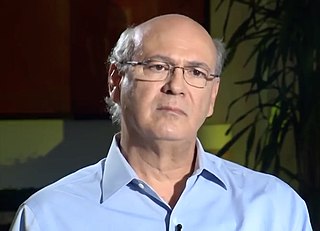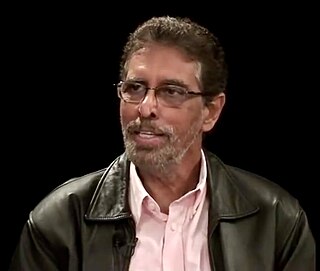Related Research Articles

José Daniel Ortega Saavedra is a Nicaraguan revolutionary and politician serving as President of Nicaragua since 2007. Previously, he was leader of Nicaragua from 1979 to 1990, first as coordinator of the Junta of National Reconstruction (1979–1985) and then as President of Nicaragua (1985–1990). After the retirement of Fidel Castro in 2008, Ortega is one of the longest-serving non-royal rulers in the world and the longest serving non-royal leader in the Americas.
Nicaragua is a nation in Central America. It is located about midway between Mexico and Colombia, bordered by Honduras to the north and Costa Rica to the south. Nicaragua ranges from the Caribbean Sea on the nation's east coast, and the Pacific Ocean bordering the west. Nicaragua also possesses a series of islands and cays located in the Caribbean Sea.

The Sandinista National Liberation Front is a socialist political party in Nicaragua. Its members are called Sandinistas in both English and Spanish. The party is named after Augusto César Sandino, who led the Nicaraguan resistance against the United States occupation of Nicaragua in the 1930s.

The Somoza family was a family dictatorship which ruled Nicaragua for forty-three years from 1936 to 1979. The dictatorship was founded by Anastasio Somoza García and was continued by his two sons Luis Somoza Debayle and Anastasio Somoza Debayle. Anastasio Somoza García was the President of Nicaragua from 1937 until 1956. He was succeeded by his eldest son, Luis Somoza Debayle, who held the presidency from 1957 to 1963. The youngest Somoza son, Anastasio Somoza Debayle, held two presidential terms: 1967-1972 and 1974-1979. Although the Somozas did not hold the presidency for the full forty-three years, they continued to rule through puppet presidents and their control of the National Guard.
Edén Atanacio Pastora Gómez was a Nicaraguan politician and guerrilla who ran for president as the candidate of the Alternative for Change (AC) party in the 2006 general elections. In the years prior to the fall of the Somoza regime, Pastora was the leader of the Southern Front, the largest militia in southern Nicaragua, second only to the FSLN in the north. Pastora was nicknamed Comandante Cero.

The Nicaraguan Revolution encompassed the rising opposition to the Somoza dictatorship in the 1960s and 1970s, the campaign led by the Sandinista National Liberation Front (FSLN) to oust the dictatorship in 1978–79, the subsequent efforts of the FSLN to govern Nicaragua from 1979 to 1990, and the Contra War, which was waged between the FSLN-led government of Nicaragua and the United States–backed Contras from 1981 to 1990. The revolution marked a significant period in the history of Nicaragua and revealed the country as one of the major proxy war battlegrounds of the Cold War, attracting much international attention.

Sergio Ramírez Mercado is a Nicaraguan writer and intellectual who was a key figure in 1979 revolution, served in the leftist Government Junta of National Reconstruction and as Vice President of the country 1985-1990 under the presidency of Daniel Ortega. He has been described as Nicaragua's "best-known living writer".
La Prensa is a Nicaraguan newspaper, with offices in the capital Managua. Its current daily circulation is placed at 42,000. Founded in 1926, in 1932 it was bought by Pedro Joaquín Chamorro Zelaya, who had become editor-in-chief. He promoted the Conservative Party of Nicaragua and became a voice of opposition to Juan Bautista Sacasa, for which the paper was censored. He continued to be critical of dictator Anastasio Somoza García, who came to power in a coup d'etat.

General elections were held in Nicaragua on 5 November 2006. The country's voters went to the polls to elect a new President of the Republic and 90 members of the National Assembly, all of whom will serve five-year terms. Daniel Ortega (FSLN) won the race with 37.99% of the vote, Eduardo Montealegre (ALN) trailing with 28.30%, José Rizo (PLC) with 27.1%, Edmundo Jarquín (MRS) with 6.29%, and Edén Pastora (AC) with just 0.29%.

Tomás Borge Martínez, often spelled as Thomas Borge in United States newspapers) was a cofounder of the Sandinista National Liberation Front in Nicaragua and was Interior Minister of Nicaragua during one of the administrations of Daniel Ortega. He was also a renowned statesman, writer, and politician. Tomás Borge also held the titles of "Vice-Secretary and President of the FSLN", member of the Nicaraguan Parliament and National Congress, and Ambassador to Peru. Considered a hardliner, he led the "prolonged people's war" tendency within the FSLN until his death.

General elections were held in Nicaragua on 25 February 1990 to elect the President and the members of the National Assembly. The result was a victory for the National Opposition Union (UNO), whose presidential candidate Violeta Chamorro surprisingly defeated incumbent president Daniel Ortega of the Sandinista National Liberation Front (FSLN). This led to a historic peaceful and democratic transfer of power in Nicaragua.
In 1979, the Sandinista National Liberation Front (FSLN) overthrew Anastasio Somoza Debayle, ending the Somoza dynasty, and established a revolutionary government in Nicaragua. Following their seizure of power, the Sandinistas ruled the country first as part of a Junta of National Reconstruction. Following the resignation of centrist members from this Junta, the FSLN took exclusive power in March 1981.

General elections were held in Nicaragua on 6 November 2011. The incumbent president Daniel Ortega, won a third term in this election, with a landslide victory.

Carlos Fernando Chamorro Barrios is a Nicaraguan independent investigative journalist. He is the founder and editor of Confidencial, a news website and weekly publication combining investigative journalism and analyses of current affairs. He also hosts two television news shows, Tonight and This Week. Chamorro is the youngest son of former president of Nicaragua Violeta Barrios de Chamorro and Pedro Joaquín Chamorro Cardenal, a Nicaraguan journalist and editor of La Prensa who was shot to death in January 1978 during the Somoza regime.

Luis F. Carrión Cruz is Nicaraguan politician. He is a former guerilla and one of the nine commandantes of the Sandinista (FSLN) National Directorate that overthrew the Somoza regime in 1979. Born to a wealthy, politically-connected family, he began college in the United States but returned to Nicaragua, first joining a radical Catholic group then the FSLN. He led the Carlos Roberto Huembes Eastern Front in Chontales during the final offensive of the revolution. He was a government minister and member of the FSLN National Directorate until 1995 when he split with party and became a cofounder of the Sandinista Renovation Movement (MRS).
Leticia Herrera Sánchez is a Nicaraguan politician and former guerrilla leader. She was one of the first women commanders of the Sandinista National Liberation Front (FSLN) against the dictatorial government of Anastasio Somoza in Nicaragua from 1974 to 1979.

Vilma Núñez de Escorcia is a Nicaraguan lawyer and human-rights activist. Born to a single mother, she developed an early concern for social justice. As an undergraduate studying law at National Autonomous University of Nicaragua in León, she met future senior government officials Carlos Tünnerman and Sergio Ramírez, and became one of the survivors of the 23 July 1959 student massacre by the Somoza National Guard. She joined the Sandinista National Liberation Front around 1975 and in 1979 was imprisoned and tortured by the Somoza regime. She was freed days before the FSLN insurrection succeeded on 19 July 1979. When they took power, she served as vice-president of the Supreme Court of Justice, then as director of the National Commission for the Promotion and Protection of Human Rights.

Hugo Torres Jiménez was a Nicaraguan Sandinista guerrilla and military leader who was a brigadier general in the Nicaraguan Armed Forces. During the Sandinista National Liberation Front effort to overthrow the Somoza family regime, Torres was the only guerrilla who participated in both the 1974 Christmas party raid that freed future President Daniel Ortega among other prisoners, and the 1978 raid on the National Palace, freeing another 60 political prisoners. In the late 1990s he became a critic of Ortega, leaving the FSLN to join the Sandinista Renovation Movement and later its successor the Democratic Renewal Union, serving as vice-president of both parties. In June 2021 he was part of a wave of arrests of opposition figures by the Ortega administration. He died the following February.

Victor Hugo Tinoco Fonseca is a Nicaraguan politician and former Sandinista guerilla. He was Deputy Minister for Foreign Affairs with the Sandinista National Liberation Front, ambassador to the United Nations and a deputy in the National Assembly. In the late 1990s he grew critical of Daniel Ortega and was expelled from the party in 2005, joining the Sandinista Renovation Movement (MRS) instead and later its successor, the Democratic Renewal Union (Unamos) party. In June 2021, he was part of a wave of arrests of opposition figures, including seven aspiring opposition candidates for president in the 2021 Nicaraguan general election.
Rosa Adelina Barahona Castro is a Nicaraguan psychologist and politician who has been the country's Minister of Defence since August 2019.
References
- 1 2 Nicaraguan Biographies: A Resource Book. U.S. Department of State, Bureau of Public Affairs. 1988. p. 24.
- 1 2 3 "Lumberto Campbell, magistrado del CSE, ¿será su nuevo Presidente? | La Gente". Radio La Primerisima (in Spanish). April 9, 2014. Retrieved 21 March 2019.
- ↑ González, Alejandra (January 21, 2018). "Lumberto Campbell, el comandante bailarín que sustituyó a Roberto Rivas". La Prensa. Retrieved 2019-03-21.
- ↑ Psaledakis, Daphne (2019-11-07). "U.S. blacklists three Nicaraguan officials in bid to pressure Ortega government". Reuters. Retrieved 2020-12-21.